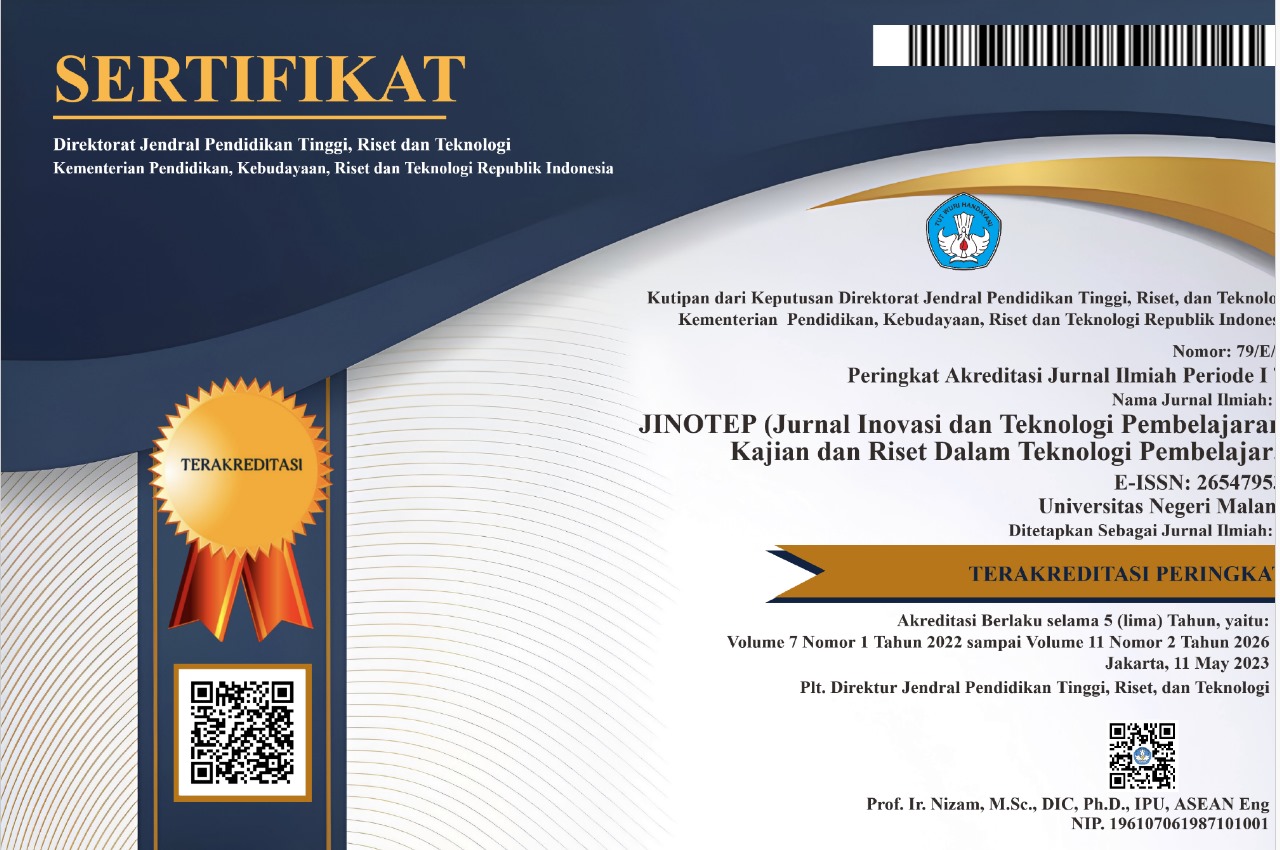Students’ Satisfaction and Encouragment of Learning Using Google Classroom During The Covid-19 Pandemic
Abstract
Abstrak: Tujuan penelitian ini yaitu untuk menginvestigasi kepuasan dan dorongan belajar menggunakan google classroom di masa pandemi COVID-19 pada institusi. Penelitian ini merupakan penelitian kuantitatif dan metode analisis data yang dipakai yakni Structural Equation Modeling-Partial Least Square (SEM-PLS) melalui aplikasi SmartPLS 3.0. dengan jumlah sampel penelitian sebanyak 130 responden yang terdiri dari mahasiswa yang telah menggunakan platform Google Classroom selama pandemi COVID-19. Hasil menunjukkan variable confirmation dan perceived usefulness secara positif signifikan mempengaruhi variable satisfaction dan continuance intention dalam penggunaan google classroom di masa pandemi COVID-19. Penelitian ini dapat memberikan wawasan baru dalam memelihara literatur keberlanjutan penggunaan teknologi pembelajaran online di masa depan.
Abstract: This study attempted to investigate the satisfaction and encouragement of learning using Google classroom during the COVID-19 pandemic in institutions. This research is quantitative research of which data were analyzed using Structural Equation Modeling-Partial Least Square (SEM-PLS) with the help of the SmartPLS 3.0 application. The 130 respondents consisting of students who have used the Google Classroom platform during the COVID-19 pandemic participated in the study. The results showed that the confirmation and perceived usefulness variables positively and significantly affected the satisfaction and continuance intention variables in the use of Google Classroom during the COVID-19 pandemic. This research can provide new insights into maintaining the literature on the sustainability of the use of online learning technology in the future
Keywords
Full Text:
PDFReferences
Al-Maroof, R. S., Alhumaid, K., & Salloum, S. (2021). The continuous intention to use e-learning, from two different perspectives. Education Sciences, 11(1), 1–20. https://doi.org/10.3390/educsci11010006
Arfat, Y., Rahman, C. A., Rahman, M., & Mahmood, K. (2018). Perceived usefulness of E-government and Computer self-efficacy to improve continuous intention to use E-Government Services. Pakistan Business Review, 20(1), 174–183. https://doi.org/10.22555/pbr.v20i1.1320
Ayu, C., Larasati, K., & Salim, R. A. (2021). "Analysis of factors influencing continuance intention of e-wallet use: a case study of LinkAja analysis of factors influencing continuance intention of e-wallet use: a case study of LinkAja. International Research Journal of Advanced Engineering and Science, 6(2), 27–33.
Bhat, S. (2018). Leveraging e-learning through google classroom: A usability study. Journal of Engineering Education Transformations, 31(3), 129–135. https://api.elsevier.com/content/abstract/scopus_id/85058369349
Cheng, Y.-M. (2018). Students’ satisfaction and continuance intention of the cloud-based e-learning system: roles of interactivity and course quality factors (p. 23). 8 August 2020. https://doi.org/DOI 10.1108/ET-10-2019-0215
Daneji, A. A., Ayub, A. F. M., & Khambari, M. N. M. (2019). The effects of perceived usefulness, confirmation and satisfaction on continuance intention in using massive open online course (MOOC). Knowledge Management and E-Learning, 11(2), 201–214. https://doi.org/10.34105/j.kmel.2019.11.010
Dash, S. (2019). Google classroom as a learning management system to teach biochemistry in a medical school. Biochemistry and Molecular Biology Education, 47(4), 404–407. https://doi.org/10.1002/bmb.21246
Erawan, Y., & Pambudi, R. (2017). Analisis penerimaan dan penggunaan teknologi google drive secara berkelanjutan pada mahasiswa Fakultas Ekonomi dan Bisnis Unika Atma Jaya Jakarta. JURNAL AKUNTANSI, 10(2), 191–205.
Khan, M., Hossain, S., & Oiriddine Abdou, B. (2020). Flipped classroom: how institutions of higher education (HEIs) of Bangladesh could move forward during Covid-19 pandemic. Benadjih, Flipped Classroom: How Institutions of Higher Education (HEIs) of Bangladesh Could Move Forward During Covid-19 Pandemic.
Khotimah, F. N. (2021). Pengaruh persepsi risiko dan expectation confirmation model terhadap niat pembelian ulang melalui mcdonald’s app. https://dspace.uii.ac.id/handle/123456789/37060
Lestari, Puji dan Nugraha, J. (2021). Analysis of using quizizz to the students of grade xii smk n 1 surabaya using the technology acceptance model. Jurnal TAM (Technology Acceptance Model), 12(2), 123–2134.
Mamun, M. R. A., Senn, W. D., Peak, D. A., Prybutok, V. R., & Torres, R. A. (2020). Emotional satisfaction and IS continuance behavior: reshaping the expectation-confirmation model. International Journal of Human–Computer Interaction, 36(15), 1437-1446. https://doi.org/10.1080/10447318.2020.1752478
Muqtadiroh, F. A., Herdiyanti, A., Wicaksono, I., & Usagawa, T. (2019). Analysis of factors affecting continuance intention of e-learning adoption in lecturers’ perspectives. IOP Conference Series: Materials Science and Engineering, 588(1). https://doi.org/10.1088/1757-899X/588/1/012022
Oktaria, A. A., & Rahmayadevi, L. (2021). Students’ perceptions of using google classroom during the covid-19 pandemic. International Journal of Educational Management and Innovation, 2(2), 153. https://doi.org/10.12928/ijemi.v2i2.3439
Osatuyi, B., Qin, H., Osatuyi, T., & Turel, O. (2020). When it comes to satisfaction… It depends: An empirical examination of social commerce users. Computers in Human Behavior, 111, 106413.. https://doi.org/10.1016/j.chb.2020.106413
Pangestika, R. R., Ngazizah, N., Suyoto, S., & Santhi, F. F. (2021). Student perceptions of online learning with google classroom during Covid-19 Pandemic. In BIS-HSS 2020: Proceedings of the 2nd Borobudur International Symposium on Humanities and Social Sciences, BIS-HSS 2020, 18 November 2020, Magelang, Central Java, Indonesia (p. 326). European Alliance for Innovation. https://doi.org/10.4108/eai.18-11-2020.2311666
Pokhrel, S., & Chhetri, R. (2021). A literature review on impact of COVID-19 pandemic on teaching and learning. Higher Education for the Future, 8(1), 133–141. https://doi.org/10.1177/2347631120983481
Pramesty, T. A. & M. A. (2021). Analisis pengaruh confirmation & satisfaction terhadap percieved usefulness yang dirasakan oleh mahasiswa pada sistem pembelajaran open learning. Borneo Student Research (BSR), 3(1), 866–872.
Rizal, R., Rusdiana, D., Setiawan, W., & Siahaan, P. (2020). Students perception of learning management system supported smartphone: Satisfaction analysis in online physics learning. Jurnal Pendidikan IPA Indonesia, 9(4), 600–610. https://doi.org/10.15294/jpii.v9i4.25363
Salloum, R. S. A.-M. & S. A. (2020). An integrated model of continuous intention to use of google classroom. In Recent advances in intelligent systems and smart applications (pp. 311-335). Springer, Cham. https://doi.org/10.1007/978-3-030-47411-9_18
Salsabilla, S., & Ayuntari, C. G. (2020). Understanding antecedents to the satisfaction of using learning management system: an empirical study of accounting students. Assets: Jurnal Akuntansi Dan Pendidikan, 9(2), 109. https://doi.org/10.25273/jap.v9i2.4927
Sasongko, D. T., Handayani, P. W., & Satria, R. (2021). Analysis of factors affecting continuance use intention of the electronic money application in Indonesia. Procedia Computer Science, 197(2021), 42–50. https://doi.org/10.1016/j.procs.2021.12.116
Sezer, B., & Yilmaz, R. (2019). Learning management system acceptance scale (LMSAS): A validity and reliability study. Australasian Journal of Educational Technology, 35(3), 15–30. https://doi.org/10.14742/ajet.3959
Sugiyono. (2017). Metode Penelitian Bisnis Alfabeta. Tsordia, C., & Papadimitriou, D. (2015). The role of theory of planned behavior on entrepreneurial intention of Greek business students. International Journal of Synergy and Research, 4, 23. https://doi.org/10.17951/ijsr.2015.4.1.23
Yalcin, M. E., & Kutlu, B. (2019). Examination of students’ acceptance of and intention to use learning management systems using extended TAM. British Journal of Educational Technology 50(5), 2414-2432. https://doi.org/10.1111/bjet.12798
Yasir, F. N., & Rusmala, R. (2021). Analisis kepuasan pengguna terhadap kualitas google classroom sebagai media e-learning menggunakan Webqual 4.0 (studi kasus: Fakultas Teknik Komputer UNCP). Proceeding KONIK (Konferensi Nasional Ilmu Komputer), 5, 198-201.
Ouyang, Y., Tang, C., Rong, W., Zhang, L., Yin, C., & Xiong, Z. (2017). Task-technology fit aware expectation-confirmation model towards understanding of MOOCs continued usage intention. (p. 10). https://doi.org/10.24251/HICSS.2017.020
DOI: http://dx.doi.org/10.17977/um031v9i22022p186
Refbacks
- There are currently no refbacks.
Copyright (c) 2022 Sarifa Achmad, Jaka Nugraha

This work is licensed under a Creative Commons Attribution-ShareAlike 4.0 International License.
======================================================================
Jurnal Inovasi dan Teknologi Pembelajaran published by Universitas Negeri Malang in collaboration with the Asosiasi Program Studi Teknologi Pendidikan Indonesia (APS TPI) and Ikatan Profesi Teknologi Pendidikan Indonesia (IPTPI) with a MoU.
Publisher Address:
Educational Technology Laboratorium, Building D5, 1st Floor
Faculty of Education, Universitas Negeri Malang
Semarang St. No. 5, Malang City, East Java Province, Postal Code 65145
Email: jinotep.fip@um.ac.id
======================================================================

JINOTEP is licensed under a Creative Commons Attribution-ShareAlike 4.0 International License.
JINOTEP Statistics (Since July 13th, 2020)



.png)




.png)
1.png)
1.png)
4.png)
2.png)
1.png)
1.png)
.png)


_3.png)





1.png)
.png)